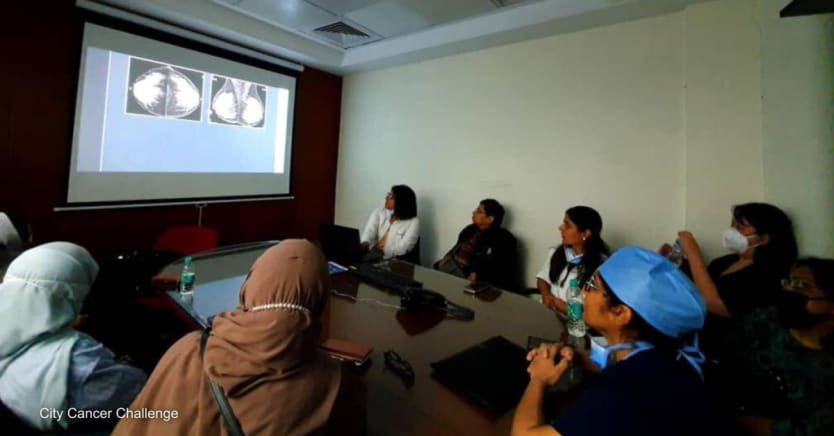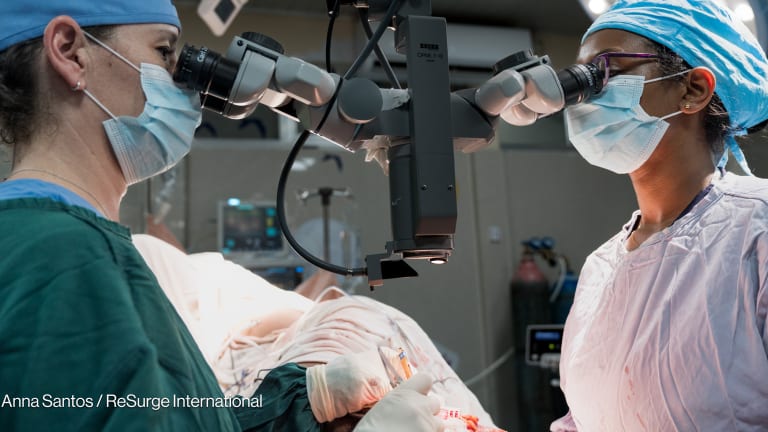
All around the world, health care systems, private sector corporations, governments, and nongovernmental organizations are working to strengthen equitable access to quality cancer care. Unfortunately, gender equity is an important element often left out of the equation — and it’s costing lives.
In fact, the 2023 landmark Women, power, and cancer: A Lancet Commission found that as many as 800,000 women out of the 2.3 million who die prematurely each year from cancer could be saved through gender-equitable cancer care. Even more arresting is that over two-thirds (72%) of premature cancer deaths among women are in countries ranked with a low Human Development Index, or HDI, compared to just over a third (36%) among women in very high-ranking HDI countries.
According to the 2024 SDG Gender Index, not a single nation is on track to achieve its 2030 gender equality goals. The latest United Nations assessment underscored “the undeniable truth: progress is achievable, but is not fast enough,” according to UN Women Executive Director Sima Bahous.
The international nonprofit City Cancer Challenge Foundation is inviting partners to join a seven-year initiative, Cities Taking Action for Gender Equity in Cancer Care, to help address the persistent gender equity gap in cancer care in low- and middle-income countries.
That’s why City Cancer Challenge, or C/Can, recently launched the multiyear commitment “Cities Taking Action for Gender Equity in Cancer Care” to address gender equity in cancer care in low- and middle-income countries. The initiative, which is calling on additional stakeholders to join its ranks, ultimately aims to integrate a gender-responsive approach into cancer care across 15 cities in Africa, Asia, Europe, and Latin America, leveraging innovative, locally driven interventions.
Dismantling gender inequities in cancer care requires addressing systemic barriers that disproportionately impact women, especially in LMICs. Based on consultation with a working group of city-led experts — as well as with members of the Lancet Commission and dozens of stakeholders around the world — we have identified four priorities to effectively advance gender equity across the cancer care continuum.
1. Centering women in cancer care
As esteemed breast surgeon and professor Nur Aishah Taib recently shared in consultation about her city-specific experiences in Malaysia: “Gender-agnostic patient-centered care is nonexistent” and this lack of patient-centricity overlooks the specific needs of women as patients.
Going forward, we must ensure that women’s voices and experiences are at the forefront of every cancer care discussion, decision, and educational opportunity. To ensure gender responsiveness, we need to encourage meaningful change in how we design health care system strategies — one that prioritizes gender equity and embeds gender considerations into every facet of policy and practice.
We can do this by starting from the ground up, working to ensure cancer care guidelines prioritize women’s unique health care needs, and empowering their health and treatment decisions every step of the way.
2. Supporting workforce development
Power imbalances and cultural practices have historically excluded women from leadership roles in academia, research, and health care. As noted by The Lancet Commission, this matters because those in positions of influence decide what is prioritized, funded, and studied. Furthermore, research shows that having a representative health care workforce can improve access to care, patient perceptions, and patient outcomes.
While shifting power dynamics can feel daunting, our working group members agreed that we can start by providing leadership training for the cancer workforce, particularly focused on clinical staff, caregivers, and researchers who can in turn extend a gender competency framework over to peers and local networks. We can also encourage greater mentorship — specifically for women in the workforce — to foster expertise exchange and create strong advocates and role models for gender equity.
3. Improving policy and practice
Where people live should not determine the quality of the care they receive, yet this is not the reality in cities around the world.
In the case of breast cancer, for example, patients generally have a good chance of survival if the cancer is detected early and they can access timely, affordable, and effective treatment. Yet, late-stage diagnosis of breast cancer is a severe problem in many LMICs, driving higher mortality. According to recent research, more than half of cases are diagnosed at the locally advanced or metastatic stages in countries in Africa, South Central Asia, and Melanesia, which can often be too late. When we look comparatively, the five-year survival rate for breast cancer ranges from 91% in the United States to 38% in South Africa — an inexcusable discrepancy.
Could blood tests make early stage cancer diagnosis accessible?
A U.S. company is developing a blood test to detect 18 types of cancers. But there is still work ahead to prove its value.
To expand access to quality care, including timely diagnosis, policymakers must not only examine cancer care standards but take the specific and often complex social dimensions of a woman’s life into account. An early diagnosis is simply not possible if a woman cannot leave her family caregiving duties, faces stigma, or cannot afford a doctor’s visit — all frequently cited barriers in LMICs.
Professor, former senator, cancer survivor and working group member Carolina Goic in Concepción, Chile, has advocated for improved policies that center on women’s distinct needs. Having helped spearhead a participatory approach to the 2020 National Cancer Law, she sees a strong foundation in place for integrating gender into policy. “We need to not only generate evidence but share it in the right way for policymakers, not just scientists,” she said. “Journalists, scientists, civil society — everyone has something to do with cancer and we all have a role to play.”
By leveraging inclusive approaches as executed in Chile, policymakers and practitioners can help ensure laws and guidelines build on the best scientific knowledge as well as prioritize the multidimensional factors that impact women’s physical, mental, and financial health.
4. Generating and exchanging local knowledge
Finally, we need to establish frameworks and indicators to effectively measure progress and impact, from the facility level up, and take the time to mine and share stories of our successes — from the small to the big. By sharing these data and stories, we can learn from each other and effectively advocate to policymakers for sustainable change. At its core, addressing gender inequity in cancer care is about improving outcomes — and that’s exactly what we believe better data can show.

Scaling up globally
C/Can is dedicated to ensuring equitable access to cancer care through localized, multisectoral approaches that address women’s specific needs. We’re calling on all partners across the health care ecosystem — from the private sector to government and technical experts — to join us on this historic mission. By focusing on city-level efforts, together we will gain a clear understanding of the cancer burden on women, while creating gender-centric evidence and insights that can be scaled globally, with the potential to impact 1.7 billion women living in LMICs around the world.
As we march rapidly toward the 2030 Sustainable Development Goals, now is the time to turn the tide and ensure that women’s care is no longer an afterthought, but integral to strengthening health care systems around the world — from the ground up.
Learn more about C/Can’s work and how to get involved: https://citycancerchallenge.org








